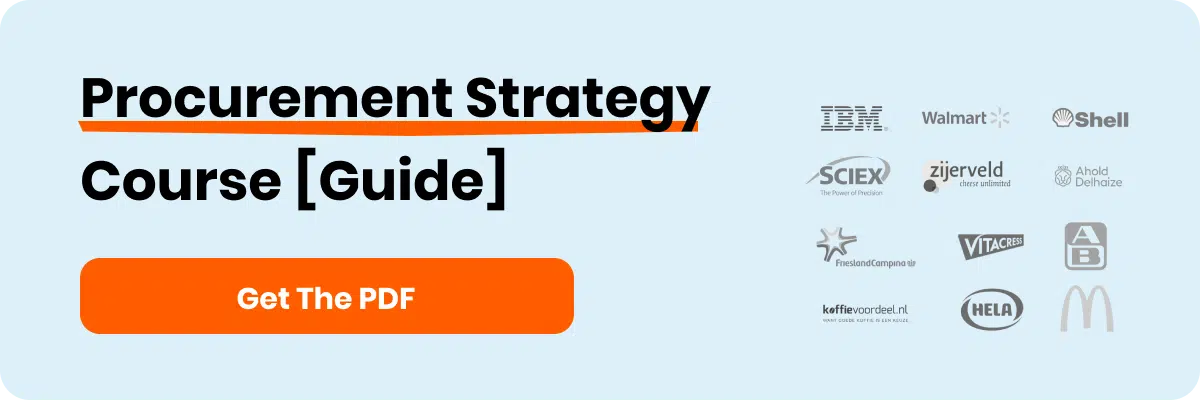ChatGPT & AI in
Procurement Course
Free Preview Lesson

Written by Marijn Overvest | Reviewed by Sjoerd Goedhart | Fact Checked by Ruud Emonds | Our editorial policy
Job Order — Everything You Should Know
Key takeaways
- Job orders maintain budgetary control throughout the procurement.
- Efficient utilization of job orders in the procurement process relies heavily on clear communication.
- Successful job orders begin with effective planning, including clear objectives, defining scope and deliverables, estimating timeframes, and identifying potential risks.
In the realm of procurement, a job order is a very efficient instrument used for initiating, monitoring, and managing the procurement process. A formal contract document that contains the detailed requirement for purchasing and obtaining goods and services, a job order is utilized with a view to ensuring that the desired goods or services are acquired in an orderly and efficient way. Job orders also set out clearly the path for procurement professionals to enable them to execute the procurement process efficiently.
For today’s article, we will explore everything you need to know about Job Orders, including what it is, their importance, and how to utilize them.
What is a Job Order?
A job order typically refers to a document or a request setting out the particular details and requirements for a specific work or task. It serves as formal instruction on what needs to be done, by whom, and within what timeframe. When it comes to procurement, a job order is created to initiate and manage the procurement process. A job order may typically include the following information:- Job Title
- Job Requirements
- The objective/s of the Job
- Coverage/scope of the Job
- Deadlines
- Deliverables
- Resources to be used
- Contact information
How can a Job Order be successful?
Utilizing a Job Order efficiently and successfully in the procurement process is crucial for several reasons. It plays a role that is a potential indicator of how well the procurement process will go, but that is only if a job order is executed successfully. Here are some factors that can make a job order successful:
1. Clear Communication
Clear communication allows for a job order to fulfill its purpose by providing specific and detailed instructions, requirements, and expectations for conducting the procuring process. Laying out the relevant details such as the quality standards, quantities, and specifications of the subject goods or services as well as the other dependencies will allow for an effective collaboration and avoid misinterpretation.
2. Effective Planning
Effective planning is where everything starts. Producing a successful job order is not as easy as it may come, that’s why planning effectively, ahead of time, and of course, with consideration to contingencies, will surely make the job order fulfill its purpose. Effective planning can begin by setting clear objectives, defining the scope and deliverables, estimating the timeframe of the procurement process, and identifying potential risks and inconveniences. All of these are considerable factors when making a job order clear, and understandable as it provides guidelines on what to put in the job order.
3. Budget Control
When it comes to maintaining budgetary control throughout the entire procurement process, job orders are crucial. Managers and businesses may be able to monitor their expenditures in comparison with the approved and allocated budget by indicating expected costs and financial parameters in a job order. This enables necessary adjustments to be carried out in line with the budgetary constraints, therefore, helps prevent potential excessive spending. A clear budget
4. Supplier Selection
Another key factor to consider when making a successful job order is by identifying the right supplier for your procurement. Procurement professionals can assess the prospective suppliers on the basis of their ability and commitment to comply with the criteria and metrics need for your business procurement needs. Ensuring that the selected supplier is aligned with the specific needs and quality standards of the procurement process to be conducted will result in a suitable supplier that can comply with the job order without any conflicts, resulting in a smooth procurement process.
5. Audit and Documentation
Job orders provide crucial documentation for audit purposes. It establishes a detailed and documented trail of the procurement process which includes selection criteria, supplier evaluation, and compliance with policies.
Benefits of Job Orders in Procurement
Below are the benefits of using job orders in your procurement operations:1. Increased Efficiency
By introducing a uniform approach to procurement procedures, job orders streamline the procurement process. They make it easier to clarify, provide clarity and minimize misunderstandings leading to errors or delays. In this way, contract experts can work more effectively and save valuable time and resources.2. Enhanced Collaboration
Collaboration among the procurement team, stakeholders, and suppliers is enhanced by job orders. The Common Reference Points serve as an instrument of cooperation, ensuring consistency between all interested parties for the purpose of achieving procurement targets and promoting efficient collaboration.3. Improved Supplier-Buyer Relationships
Transparent relations with suppliers are also facilitated by clear and detailed job orders. Job orders enable suppliers to supply products or services that meet the business’ specific needs by giving them a comprehensive set of requirements and expectations. It strengthens trust and encourages the establishment of lasting partnerships.4. Compliance and Audit
Job Orders contribute to compliance with internal policies, regulations, and audit requirements. They shall ensure that a documented record of the procurement procedure, which can be vital for audits, contract management, and law enforcement purposes, is kept.Softwares Available for Creating and Managing Job Orders
1. Coupa
Coupa offers a feature specifically designed for creating and managing job orders. It provides workflows, document management, and reporting functions for procurement needs.
2. Procurify
Procurify is equipped with a variety of tools that optimize procurement tasks. Creating a job order as well as purchase orders is one of them. It also comes with its own mobile application for iOS and Android devices which makes it very accessible.
3. SAP Ariba
SAP Ariba is a cloud bases procurement software that provides spending management, and supply chain services that allow suppliers and buyers to connect and do business, worldwide. Provides other functions such as sourcing, contracting, supplier management, and payment management.
4. Kissflow
Kissflow is a cloud-based procurement software tool that helps businesses manage their procurement process from requisition to payment. It includes supplier management, contract management, and spending analysis.
Conclusion
In conclusion, job orders are vital documents in the procurement process, providing clear instructions and guidelines. The success of job orders depends on factors such as clear communication, effective planning, budget control, supplier selection, and thorough audit documentation.
Utilizing job orders efficiently enhances the overall efficiency of procurement procedures, promotes collaboration among stakeholders, fosters transparent supplier-buyer relationships, and ensures compliance with internal policies and regulations.
Implementing best practices, using appropriate software tools, and conducting post-procurement reviews are essential for continuous improvement in future job orders.
Frequentlyasked questions
What is a Job Order?
A job order typically refers to a document or a request setting out the particular details and requirements for a specific work or task. It serves as formal instruction on what needs to be done, by whom, and within what timeframe.
Why is Job Order important?
Utilizing a Job Order is crucial in the procurement process is crucial for several reasons as it contributes to factors such as clear communication, effective planning, budget control, supplier selection, and audit and documentation.
How to Utilize Job Orders?
Start by identifying the specifics of the procurement, creating a job order via software, and then using the job order to select your supplier, track the progress, control the budget, and review the procurement process.
About the author
My name is Marijn Overvest, I’m the founder of Procurement Tactics. I have a deep passion for procurement, and I’ve upskilled over 200 procurement teams from all over the world. When I’m not working, I love running and cycling.


